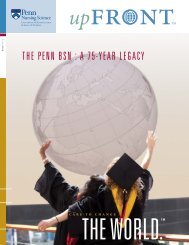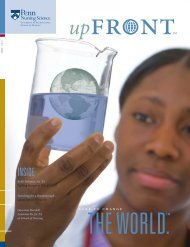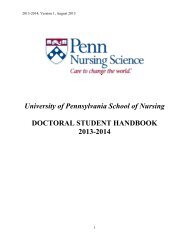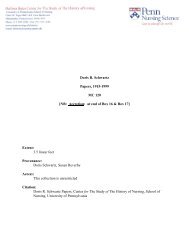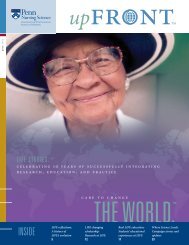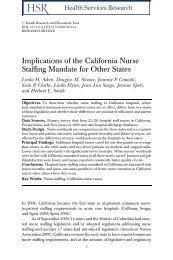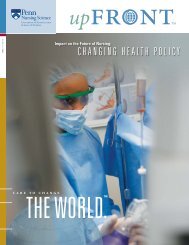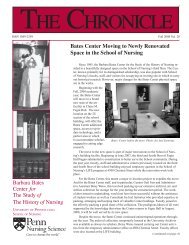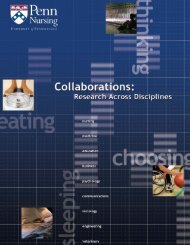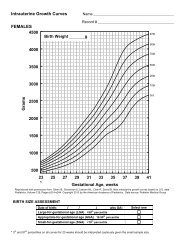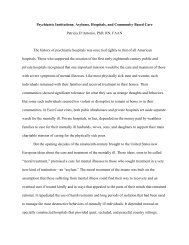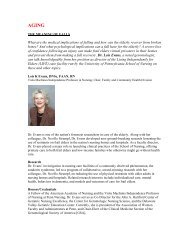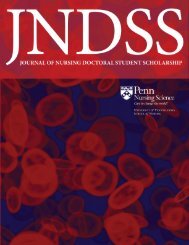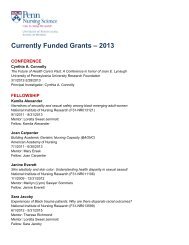Research Centers - University of Pennsylvania School of Nursing
Research Centers - University of Pennsylvania School of Nursing
Research Centers - University of Pennsylvania School of Nursing
Create successful ePaper yourself
Turn your PDF publications into a flip-book with our unique Google optimized e-Paper software.
Linda H. Aiken, PhD, RN, FAAN, FRCN<br />
Healing Hospitals: Improving Patient Outcomes at Home and Abroad<br />
The Claire M. Fagin Distinguished <strong>Research</strong> Award 2007<br />
“The purpose <strong>of</strong> the Claire Fagin<br />
Distinguished <strong>Research</strong> Award is to honor<br />
Dr. Fagin, to recognize our faculty, and to be<br />
inspired by our faculty’s accomplishments,”<br />
said Afaf I. Meleis PhD, DrPS(hon), FAAN,<br />
FRCN, the Margaret Bond Simon Dean <strong>of</strong><br />
<strong>Nursing</strong>, as she introduced the Fifth Claire<br />
M. Fagin Distinguished <strong>Research</strong> Award<br />
lecturer.<br />
Before an audience <strong>of</strong> family,<br />
friends, current and former students, and<br />
colleagues, Linda H. Aiken, HOM ’88,<br />
PhD, RN FAAN, FRCN, the Claire M. Fagin<br />
Leadership Pr<strong>of</strong>essor in <strong>Nursing</strong>, Pr<strong>of</strong>essor<br />
<strong>of</strong> Sociology, and Director <strong>of</strong> the Center<br />
for Health Outcomes and Policy <strong>Research</strong><br />
(CHOPR) presented her extensive research<br />
regarding the international nursing shortage<br />
and its subsequent effects on patient<br />
care — research that has not only inspired<br />
colleagues, but has influenced policies in the<br />
United States and around the world.<br />
Among those in attendance to hear<br />
Dr. Aiken present “Healing Hospitals:<br />
Improving Patient Outcomes at Home and<br />
Abroad” was Dr. Fagin, PhD, FAAN, RN,<br />
Dean Emerita and former interim Penn<br />
President. Dr. Fagin, one <strong>of</strong> the nation’s first<br />
nursing deans to recognize the value <strong>of</strong><br />
nursing research through the creation <strong>of</strong> a<br />
funded research center, was responsible for<br />
recruiting Dr. Aiken to Penn <strong>Nursing</strong> in 1988.<br />
“Dr. Aiken was born a star,” said Dr. Fagin.<br />
“She has always excelled in everything she<br />
has done,” recently landing on the Modern<br />
Healthcare magazine’s list <strong>of</strong> the top 100<br />
most influential people in the number 20<br />
spot, right behind Hillary Clinton.<br />
Recently, Dr. Aiken’s research has<br />
focused on the global nursing shortage and<br />
how to alleviate it. She believes researchers<br />
must use their findings to create a “burning<br />
platform” that will “mobilize a broad<br />
constituency for addressing the inter-related<br />
problems <strong>of</strong> ailing hospitals and inadequate<br />
global nurse workforce.”<br />
Dr. Aiken’s long research career has<br />
produced many important findings including<br />
that for every one additional patient added<br />
to a hospital staff nurse’s workload, patient<br />
mortality after common surgery increases<br />
by seven percent. “Hospitals with more<br />
RNs and better patient care environments<br />
have better patient outcomes and nurse<br />
retention,” she said.<br />
According to Dr. Aiken, negative<br />
work environments and failed human<br />
resources policies also contribute to poor<br />
nurse retention, which then leads to an<br />
increase in preventable patient deaths and<br />
complications. “Nurses are not treated by<br />
hospitals as the scarce resources they are,”<br />
she said. “Nurses report negative work<br />
environments in hospitals and lack <strong>of</strong> regard<br />
for their expertise and education.”<br />
Dr. Aiken’s team also found that each<br />
10 percent increase in proportion <strong>of</strong> hospital<br />
staff nurses with BSNs is associated with<br />
a five percent decline in mortality and a<br />
five percent decline in the risk <strong>of</strong> death <strong>of</strong><br />
patients with complications (also known<br />
as failure to rescue). “More than 40,000<br />
hospital deaths could be prevented each<br />
year if all U.S. hospitals improved the quality<br />
<strong>of</strong> their nurse practice environments, nurse<br />
“The purpose <strong>of</strong> the Claire Fagin Distinguished <strong>Research</strong> Award is to honor<br />
Dr. Fagin, to recognize our faculty, and to be inspired by our faculty’s<br />
accomplishments,” said Afaf I. Meleis PhD, DrPS(hon), FAAN, FRCN, the<br />
Margaret Bond Simon Dean <strong>of</strong> <strong>Nursing</strong>, as she introduced the Fifth Claire<br />
M. Fagin Distinguished <strong>Research</strong> Award lecturer.<br />
to patient ratios and nurse education to<br />
the levels in the ‘better’ hospitals,” said Dr.<br />
Aiken.<br />
Yet, the U.S. nursing shortage is<br />
not unique. The International Hospital<br />
Outcomes Study (IHOS) was developed and<br />
designed at and has been coordinated by<br />
the <strong>School</strong> <strong>of</strong> <strong>Nursing</strong>’s CHOPR. It began as<br />
a consortium <strong>of</strong> eight interdisciplinary nurseled<br />
research teams in the United States,<br />
Canada, United Kingdom, Germany, and<br />
New Zealand studying the factors that cause<br />
the nursing shortage and potential solutions.<br />
In recent years, the IHOS measurement<br />
tools and approach have been used by<br />
teams in Switzerland, Belgium, Iceland,<br />
Australia, Japan, Thailand, and South Korea.<br />
Remarkable similarities have been found in<br />
the working conditions reported by nurses<br />
and in the connections between staffing and<br />
other factors related to patient outcomes.<br />
According to 2001 findings, 66 percent <strong>of</strong><br />
U.S. hospital nurses reported there were not<br />
september 2007 | 37



